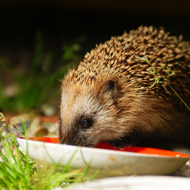Wildlife charities bust hedgehog myths

Hedgehog numbers continue to decline in both rural and urban areas.
Wildlife charities People’s Trust for Endangered Species (PTES) and the British Hedgehog Preservation Society (BHPS) have shared the top five myths surrounding hedgehogs in a bid to save the declining species.
Over the years, numerous myths have developed about hedgehogs that could be hampering conservation efforts. The organisations say that busting these myths will ensure that everyone involved in trying to conserve the species has the correct information to hand.
The first myth busts the prickly craze of pet hedgehogs. Britain’s native hedgehog is often mistaken for the African pygmy hedgehog, made popular by social media and YouTube. African pygmy hedgehogs have pale facial hair, lighter spines and pointier features. Native hedgehogs, however, have darker, more rounded features.
The second myth busts the idea that there were three million hedgehogs in Britain in the 1950s. The theory was suggested by naturalist Maurice Burton during a visit to the Royal Botanic Gardens at Kew. “In truth, we have no idea how many hedgehogs there were in the 1950s, though we do know they were more abundant,” the charities say.
Other myths busted by the organisations include the idea that British hedgehogs are threatened with extinction and the belief that hedgehogs transmit fleas to pets. They also raise the issue of hedgehog diet and advise people against feeding hedgehogs bread and milk.
In 2015, a report published by the BHPS and the PTES revealed the state of Britain’s hedgehogs. It showed a continuing decline in hedgehog numbers, in both rural and urban areas.
The loss of hedgerows and intensive farming in rural landscapes, together with tidy, fenced-in gardens in urban locations, are just some of the threats contributing to the demise of this iconic British species.



 The latest
The latest